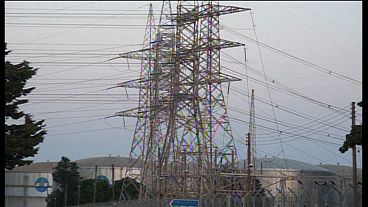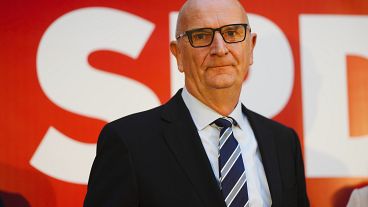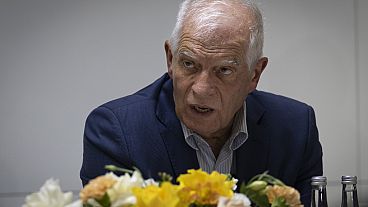The latest projections at 8pm on Sunday indicate that the ruling SPD maintains its narrow lead on the far-right AfD, but its leader urged members to “put on the euphoria brakes” until the final results are clear.
German Chancellor Olaf Scholz has likely narrowly averted questions being asked about how secure his future is as Germany's leader, as his party looks set to maintain its lead in the Brandenburg state election.
The latest Infratest dimap exit poll at 8pm indicates the SPD got 30% and the far-right AfD party got 29%.
The populist AfD and the Sahra Wagenknecht Alliance both recorded significant gains in votes. Euronews Berlin correspondent Liv Stroud indicates that the left-wing Greens and Die Linke are the biggest losers of this election, as they may not have managed to secure the 5% threshold to get a seat in the state parliament.
SPD leader urges party members to 'put on the euphoria brakes'
Brandenburg's prime minister and SPD leader Dietmar Woidke, who has led the state for the past 11 years, expressed relief at the results.
Prior to the election, he said he would resign if his party lost to the far-right AfD, staking his entire career on Sunday's vote. So far, it seems like his gamble has paid off, but he urged SPD members to "put on the euphoria brakes" until the final results are clear.
AfD leaders have also called their party's performance in Brandenburg a huge success. Alice Weidel, co-leader of the AfD's parliamentary group in the Bundestag, declared confidently: "I say these bars will shift and we are the winners of the evening".
Hans-Christian Berndt, the AfD's candidate for Brandenburg, echoed this sentiment and highlighted the growing influence of the party.
Around 2.1 million people were registered to vote for a new state parliament in Brandenburg, the state that surrounds Berlin, the capital of Germany.
The Social Democrats, the largest party in Chancellor Olaf Scholz's three-way coalition government, are hoping to maintain control of their stronghold in the face of rising support for parties on the extreme right and left.
The far-right Alternative for Germany also did well in state elections earlier this month, winning the most votes in Thuringia and Saxony. The win generated concerns in Germany and abroad about growing support for the extreme right in the largest European Union country.
The far-right party has gained support amid a growing backlash to large-scale migration to Germany over the past decade and several recent extremist attacks.
Political scientists have underlined that other parties have promised not to cooperate with the AfD. However, the other two East German states that voted this month, Thuringia and Saxony, have been struggling to form coalitions, especially with BSW boss Sahra Wagenknecht placing foreign policy demands at a federal level.












